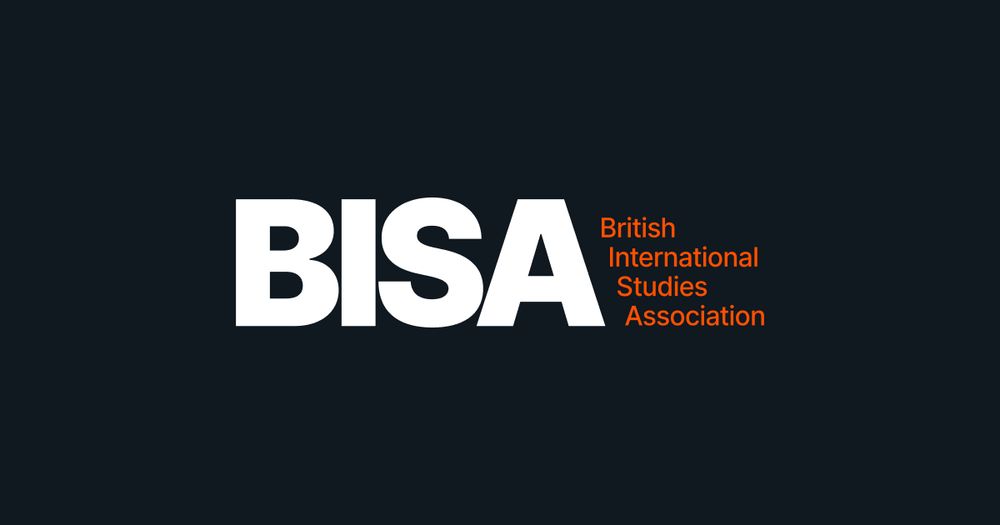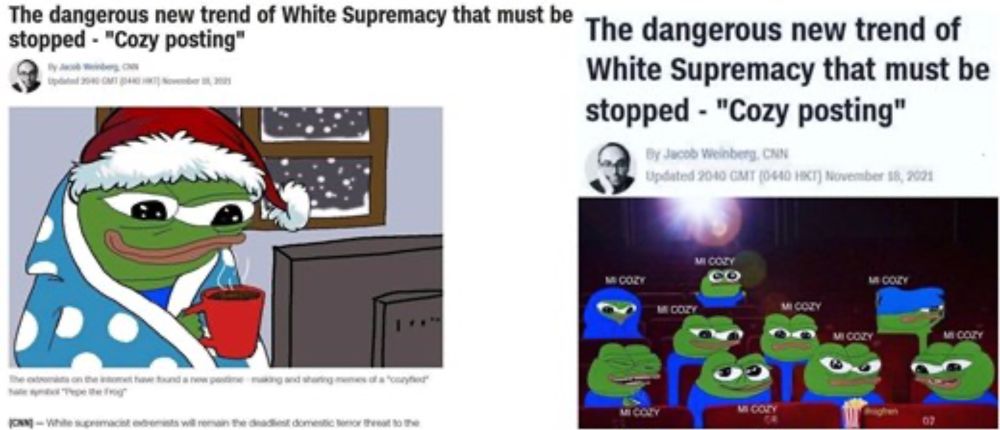
Susan Strange meets the everyday: The mundane sources of structural power
Kasper Arabi discuss the key points from his new RIS article.
'Susan Strange meets the everyday: The mundane sources of structural power' 🌎
🎉 Read a summary of this fascinating new @kasperarabi.bsky.social @risjnl.bsky.social article 👉 buff.ly/96iK4c2
🌟 Want more? Read the full article: buff.ly/sm0UU7q
@cambup-polsci.cambridge.org @warwickpais.bsky.social
25.09.2025 16:01 — 👍 3 🔁 3 💬 0 📌 0

🚨New First View Article🚨
"Susan Strange meets the everyday: The mundane sources of structural power" by Kasper Arabi is now available #OpenAccess!
Check it out here 📄 ➡️ buff.ly/JhgVo3k
18.09.2025 08:13 — 👍 2 🔁 2 💬 0 📌 1
Many thanks, Nat. This paper really grew out of the Strange conference in London last year.
16.09.2025 12:30 — 👍 2 🔁 0 💬 0 📌 0
Thanks for introducing me to both Susan Strange and everday research, Ben! Had to find my slightly warped copy of States and Markets, which I originally bought for the 2019 IPE specialization at UCPH, to write this!
16.09.2025 12:27 — 👍 2 🔁 0 💬 0 📌 0
While everyday grievances were filtered out by the selective context for decades (due to factors such as cheap credit), the perceptual selectivity of the US state has shifted and paved the way for those perceptions to inform the most powerful offices in DC.
16.09.2025 07:41 — 👍 2 🔁 0 💬 1 📌 0
I illustrate these mechanisms empirically using Trump’s Liberation Day tariffs. Zooming in on transformations of the American sphere of production, I conclude that the tariffs partly can be explained by shifting everyday perceptions in former US industrial powerhouses.
16.09.2025 07:41 — 👍 3 🔁 0 💬 1 📌 0
Drawing on state theory, I argue that a perceptual selectivity is key to understanding the relationship between the everyday and how the state projects its power internationally. While some everyday perceptions have access to (international) policymaking, others are blocked by the selective context.
16.09.2025 07:41 — 👍 2 🔁 0 💬 1 📌 0

To overcome this, I approach the state as an intermediary between the everyday on one hand and structural power in the international system on the other. A given state’s deployment of structural power, my argument goes, depends on everyday legitimacy to remain stable.
16.09.2025 07:41 — 👍 2 🔁 0 💬 1 📌 0
While more than 35 years have passed since Susan Strange published her four-faceted notion of structural power in States and Markets, the concept still offers much to analyses of contemporary international affairs. Yet, its everyday underpinnings remain vastly undertheorized.
16.09.2025 07:41 — 👍 2 🔁 0 💬 1 📌 0

New paper out in @risjnl.bsky.social! 🚨
I explore the everyday foundations of structural power in the international system and advance a new theoretical framework that reconceptualizes the state as a mediator between the two levels.
Time for a short thread! 🧵👇
16.09.2025 07:41 — 👍 19 🔁 7 💬 3 📌 1

Sage Journals: Discover world-class research
Subscription and open access journals from Sage, the world's leading independent academic publisher.
Happy pancake day everyone! Here’s a brand new recipe that I’ve spent months working on. Please download and tell your friends! It’s called:
Fantasy and the figure: ideological bodies in the Nordic Resistance Movement
journals.sagepub.com/doi/10.1177/...
04.03.2025 15:34 — 👍 10 🔁 7 💬 0 📌 0
Congrats, Chris! 🎉
12.03.2025 04:14 — 👍 1 🔁 0 💬 0 📌 0
Sejt! Tillykke, Rune. Det ser vildt spændende ud!!
28.02.2025 08:13 — 👍 0 🔁 0 💬 0 📌 0

The end of economics hegemony? studying economic ideas in a post-neoliberal world
Since the 1990s, a particular approach to analysing the political influence of economic ideas has emerged in International Political Economy (IPE)—often labelled ‘the ideational turn’. This approac...
New article out📑
"The end of economic hegemony? Studying economic ideas in a post-neoliberal world"
In the 20th century, debates on economic policy were closely tied to academic economics. From Keynesianism to neoliberalism, economic schools of thought have shaped historical epochs.
26.02.2025 13:00 — 👍 112 🔁 35 💬 11 📌 2

Thrilled to have the first article of my PhD published in @cpsjournal.bsky.social. Focusing on Denmark in the 1910s, the article shows how democratic politicians use foreign revolutions opportunistically to attract voters. (1/4)
18.12.2024 09:38 — 👍 26 🔁 7 💬 2 📌 1

The 2024 Elections: Votes cast for Trump over ‘the economy’ may be as much about race as inflation
Many commentators have sought to explain Donald Trump’s 2024 election win through Americans’ concerns about inflation and the economy more broadly. Through her research which explores how Americans…
My first blog looking at race, 'the economy' and the 2024 election. This one is for American #PoliSci scholars, looks at the perennial polling of 'the economy' as the most important issue in US elections. Please let me know what you think. #PoliSky wp.me/p3I2YF-exK
25.11.2024 18:47 — 👍 6 🔁 1 💬 0 📌 2
I put together a starter pack of people who work on political economy histories, and intersections between history and political economy. Let me know if you would like to be added or have suggestions on people to add.
18.11.2024 15:37 — 👍 71 🔁 26 💬 17 📌 0
I hope this piece encourages IPE scholars to rediscover hegemony studies and makes current hegemony scholars aware of recent developments within IPE. Doing so, I argue, will allow the scholarship’s current period of progress and development to continue for even longer.
(7/8)
18.11.2024 07:20 — 👍 1 🔁 0 💬 1 📌 0
However, by highlighting recent developments within IPE as ways forward, I show how hegemony scholarship has parted ways with IPE over the past ~20 years. While hegemony studies were once an integrated part of IPE, they now seem more aligned with IR and/or Security Studies.
(6/8)
18.11.2024 07:20 — 👍 0 🔁 0 💬 1 📌 0
To move beyond this, I point to the everyday turn in IPE and the broader (re)historicization of the field. These are just suggestions, and I am sure there are many other ways to overcome methodological statism.
(5/8)
18.11.2024 07:20 — 👍 0 🔁 0 💬 1 📌 0
I call this methodological statism in an attempt to highlight how important non-statist, domestic processes, practices, and actors are largely absent in the scholarship’s methodological and analytical strategies - despite their recognition in theory.
(4/8)
18.11.2024 07:20 — 👍 1 🔁 0 💬 1 📌 0
These are exciting developments! However, despite good intentions, I find that this new domestic focus is still characterized by a state-centered bias that treats the domestic sphere of the hegemon as if it were equal to the hegemonic state and its formal institutions.
(3/8)
18.11.2024 07:20 — 👍 0 🔁 0 💬 1 📌 0
A lot of fascinating studies on hegemony have been published recently. Expanding the boundaries of the scholarship, researchers are increasingly embracing intra-state dynamics and domestic non-state actors as part of hegemony studies.
(2/8)
18.11.2024 07:20 — 👍 0 🔁 0 💬 1 📌 0

Reposting on this platform:
🚨Publication alert! 🚨
Happy to see this paper has found its home in RIPE! I address Hegemony Studies 3.0 and argue that contemporary studies of inter-state hegemony suffer from widespread methodological statism.
What does that mean? I explain below. 🧵👇
(1/8)
18.11.2024 07:20 — 👍 12 🔁 4 💬 1 📌 0
PhD Candidate | Politics & International Studies, University of Warwick | Peacekeeping, Legitimacy & legitimation, AU-UN partnership
Professor of the International Politics of the Middle East, trade unionist, anti-imperialist, feminist
Reader in US Foreign Policy, Politics and Popular Culture -
@warwickpais.bsky.social
PhD Candidate @warwickpais.bsky.social
IR | Foreign Policy Analysis | Diplomatic Studies | Global South | BRICS
Researcher in social policy & EU governance | Curious about how policies shape everyday lives | Bulgarian abroad 🇧🇬 climber 🧗♀️ coffee enthusiast ☕️
Doing a PhD at @PAISwarwick and @MonashPolsIR. Interested in geopolitics, critical security studies, British politics, and the Anglosphere.
Doctoral candidate in politics @paiswarwick, interest in the uses and effects of direct democracy around the world, politicisation, nationalism, and a bunch of other stuff
Postdoc @sotonpolitics.bsky.social, interested in nostalgia, visual politics and the gothic.
"Needlessly polemical"
https://www.southampton.ac.uk/people/65lr7v/doctor-francesca-melhuish
Dedicated to the promotion of interdisciplinary research in the social sciences. Likes/Reposts/Shared Articles are not necessarily endorsements.
Economic policy and stuff
PAIS are great at what we do; Comparative Politics, IR & Security, Political Theory, IPE, Environmental Politics and more.
PhD Researcher connected to the Free University of Brussels (VUB) and University of Warwick (she/her)
☁️ Working on topics of #representation #performance and #claimmaking
☁️ (Mostly) Based in #Brussels
The Royal Historical Society is the UK's foremost society promoting the scholarly and professional study of the past. Our membership is an international community of historians: https://royalhistsoc.org/
ULB/Warwick/UvA PhD, EU politics, Georgia, Serbia
Official account for the Joint Center for History and Economics at Harvard University, University of Cambridge and Sciences Po.
https://histecon.fas.harvard.edu/
https://www.histecon.magd.cam.ac.uk/
https://histecon.fr/en/
We are the American Politics Specialist Group of the Political Studies Association (@polstudiesassoc.bsky.social)
Web: www.psa.ac.uk/specialist-groups/american-politics
Small States in World Politics. Foreign Policy. Peaceful Change. Political Realist and Professor of International Relations, University of Copenhagen. https://anderswivel.com/
Associate Professor in Business and Public Policy at Roskilde University
https://thomaspaster.wordpress.com/
The Critical Political Economy Research Network of the ESA
Subscribe here: https://www.jiscmail.ac.uk/cgi-bin/webadmin?A0=POLITICAL-ECONOMY-RN
Website: https://criticalpoliticaleconomy.net/
Researcher at DIIS. Researching the Wagner Group and Russia’s use of ‘PMCs’ | Co-host at Frontlinjen at Radio IIII













